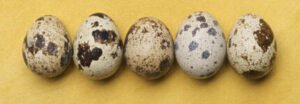Medically reviewed by Dr. Ramesh Gaddam, M.D. — Written by Sumalatha, D.N.H.E
Table of Contents
ToggleQuail meat refers to the meat obtained from quails, which are small game birds belonging to the pheasant family. Quail meat is known for its tender texture, mild flavor, and relatively small size. These birds are commonly raised for their eggs and meat, and their culinary use varies across different cultures.
Nutrition of Quail Meat
Nutrition of quail meat per 100 grams.
| Nutrient | Amount per 100g |
|---|---|
| Calories | 158 kcal |
| Protein | 23.6 g |
| Total Fat | 6.3 g |
| Saturated Fat | 1.7 g |
| Monounsaturated Fat | 2.7 g |
| Polyunsaturated Fat | 1.4 g |
| Cholesterol | 76 mg |
| Sodium | 74 mg |
| Potassium | 270 mg |
| Total Carbohydrates | 0 g |
| Dietary Fiber | 0 g |
| Sugars | 0 g |
| Vitamin A | 13% DV |
| Vitamin C | 0% DV |
| Calcium | 1% DV |
| Iron | 10% DV |
| Vitamin B6 | 10% DV |
| Vitamin B12 | 52% DV |
| Magnesium | 6% DV |
| Zinc | 17% DV |
Health Benefits of Quail Meat

Quail meat offers several health benefits, and while it may not be as commonly consumed as other meats, it provides a range of nutrients that can contribute to a balanced diet. Here are some potential health benefits of quail meat:
Rich in Protein:
Quail meat is a good source of high-quality protein, which is essential for muscle maintenance, repair, and overall growth. Protein is also important for various bodily functions, including enzyme and hormone production.
Low in Fat:
Quail meat is relatively low in fat compared to some other meats, making it a lean protein source. It contains less saturated fat, and the fat it does contain is often considered healthier, with a good balance of monounsaturated and polyunsaturated fats.
Rich in Vitamins:
Quail meat is a good source of various vitamins, including B vitamins such as B6 and B12. These vitamins play a crucial role in energy metabolism, nerve function, and the formation of red blood cells.
Mineral Content:
Quail meat provides essential minerals like iron, zinc, and magnesium. Iron is important for oxygen transport in the blood, zinc supports immune function, and magnesium is involved in muscle and nerve function.
Low Allergenic Potential:
Quail meat is considered to have a lower allergenic potential compared to some other meats. This can be beneficial for individuals with specific food sensitivities or allergies.
Bioavailable Nutrients:
The nutrients in quail meat are generally well-absorbed by the body, contributing to their bioavailability. This means that the body can efficiently use the nutrients present in quail meat.
Collagen Content:
Quail meat contains collagen, a structural protein that is important for skin, joint, and connective tissue health. Consuming collagen-rich foods can contribute to overall joint and skin health.
Low in Calories:
Quail meat is relatively low in calories, which can be beneficial for those looking to manage their calorie intake. This, coupled with its rich nutrient profile, makes it a nutrient-dense food.
It’s important to note that while quail meat can be a healthy part of a balanced diet, moderation and variety are key to obtaining a broad spectrum of nutrients. Additionally, individual dietary needs and health conditions can vary, so it’s always a good idea to consult with a healthcare professional or a registered dietitian for personalized advice.
Taste and Flavor of Quail Meat
Quail meat is known for its distinctive taste and flavor, which is appreciated by many culinary enthusiasts. Here are some characteristics of the taste and flavor of quail meat:

Mild and Delicate:
Quail meat has a mild and delicate flavor. It is not as gamey or strong as some other game meats, making it appealing to those who may find stronger flavors less palatable.
Slightly Sweet:
The meat is often described as having a subtle sweetness, which adds to its overall appeal. This sweetness can make quail a versatile ingredient in a variety of culinary preparations.
Tender Texture:
Quail meat is known for its tenderness. The texture is tender without being overly soft, providing a pleasant eating experience. This characteristic makes it suitable for various cooking methods.
Versatile for Seasoning:
Due to its mild flavor, quail meat is versatile when it comes to seasoning and marinades. It pairs well with a variety of herbs, spices, and sauces, allowing for creative and diverse culinary applications.
Juicy and Succulent:
When prepared properly, quail meat can be juicy and succulent. Cooking methods such as roasting, grilling, or pan-searing are often used to retain moisture and enhance the natural flavors.
Nutty Undertones:
Some people describe a subtle nutty undertone in the flavor of quail meat. This nuance can add depth to dishes and complement a range of ingredients.
The unique taste and texture of quail meat make it a popular choice in gourmet and fine-dining establishments. It’s often featured in upscale dishes where its distinctive characteristics can be highlighted and appreciated.
Additionally, because of its mild flavor, quail is sometimes used in recipes as a substitute for other poultry meats like chicken or turkey, offering a different culinary experience.
Side Effects of Quail Meat
Quail meat is generally considered safe and nutritious for consumption, but like any food, it may have some considerations and potential side effects. Here are a few points to keep in mind:

Allergies:
While quail meat is not a common allergen, individuals with a history of poultry allergies or egg allergies should exercise caution. It’s advisable for people with known food allergies to consult with a healthcare professional before introducing new foods into their diet.
Cholesterol Content:
Quail meat contains dietary cholesterol, and excessive consumption of high-cholesterol foods may contribute to elevated cholesterol levels in some individuals. If you have concerns about cholesterol, it’s recommended to moderate your intake and consider overall dietary patterns.
Purine Content:
Quail meat contains purines, which are natural substances found in some foods. In individuals with gout or kidney issues, high-purine foods may contribute to increased uric acid levels.
Those with such conditions may need to monitor their purine intake, although quail meat is generally considered to have moderate purine levels compared to some other meats.
Food Safety Concerns:
As with any meat, it’s crucial to handle and cook quail meat properly to reduce the risk of foodborne illnesses. Ensure that the meat is cooked to a safe internal temperature and practice good hygiene during preparation to prevent cross-contamination.
Sensitivity to Fats:
While quail meat is lower in fat compared to some other meats, individuals with sensitivities to certain types of fats or those with digestive issues may need to moderate their intake.
It’s essential to note that individual responses to foods can vary, and what might be well-tolerated by one person may cause issues for another. If you have specific health concerns or conditions, it’s advisable to consult with a healthcare professional or a registered dietitian before making significant changes to your diet.
Quail meat can be considered a healthy dietary choice due to several reasons:
Rich in Protein:
Quail meat is a good source of high-quality protein, essential for muscle development, repair, and overall bodily functions.
Low in Fat:
Quail meat is relatively low in fat, particularly saturated fat, making it a lean protein option.
Nutrient Dense:
Quail meat contains various essential nutrients, including vitamins such as B6 and B12, iron, zinc, and magnesium.
Low Allergenic Potential:
Quail meat is generally considered to have a lower allergenic potential compared to some other meats, making it suitable for individuals with certain food sensitivities.
Quail meat is heat or cold for body?
Quail meat is generally considered warming or heating in nature according to traditional Chinese medicine. It is believed to provide warmth to the body and support functions such as circulation and digestion.
In Ayurveda, which is an ancient system of medicine from India, quail meat might also be considered heating, as it is animal-based.
Who Should Not Eat Quail Meat?
While quail meat is generally safe for consumption, individuals with specific conditions or dietary considerations should exercise caution:
Allergies: Individuals with allergies to poultry or eggs should be cautious and may want to consult with a healthcare professional before consuming quail meat.
Dietary Restrictions: People following specific dietary restrictions or ethical choices, such as vegetarian or vegan diets, would avoid quail meat.
Is Quail Good for Kidney Patients?
Quail meat can be a part of a kidney-friendly diet, but individuals with kidney issues should consider certain factors:
Protein Content: Quail meat is a good source of protein, but individuals with kidney disease may need to monitor their protein intake. Consulting with a healthcare professional or dietitian is recommended to determine individual dietary needs.
Phosphorus: Kidney patients often need to limit phosphorus intake, and quail meat, like other meats, contains phosphorus. Moderation and monitoring of overall dietary phosphorus are advised.
Is Quail High in Uric Acid?
Quail meat contains purines, which can contribute to uric acid formation. While quail meat is not exceptionally high in purines compared to some other meats, individuals with gout or those prone to high uric acid levels should moderate their intake.
Consulting with a healthcare professional can help determine the suitability of quail meat in individual dietary plans.
Is Quail Meat Bad for Cholesterol?
Quail meat, like most meats, does contain dietary cholesterol, but it is generally not considered detrimental to cholesterol levels when consumed as part of a balanced diet.
The key is moderation and maintaining a healthy overall dietary pattern. If you have specific concerns about cholesterol, it’s advisable to monitor your overall intake of dietary cholesterol and saturated fats and consider your individual health status.
Can You Eat Quail Daily?
While quail meat is a nutritious source of protein and various essential nutrients, consuming any food daily in excessive amounts may lead to an imbalance in your overall diet.
It’s essential to maintain variety in your diet to ensure you get a broad spectrum of nutrients from different food sources. Additionally, individual dietary needs can vary, and factors such as overall calorie intake, specific nutrient requirements, and personal health goals should be considered.
Consultation with a healthcare professional or a registered dietitian can provide personalized advice based on your specific circumstances.
Is Quail Good for Fatty Liver?
Quail meat can be a part of a diet for individuals with fatty liver disease, but it’s essential to consider overall dietary choices and lifestyle factors. Some points to consider:
Low in Saturated Fat:
Quail meat is generally low in saturated fat, which is beneficial for individuals with fatty liver disease.
Rich in Protein:
Quail meat provides a good source of protein, which is important for overall health. However, if you have liver issues, it’s advisable to monitor your protein intake and consult with a healthcare professional or dietitian for personalized guidance.
Overall Diet and Lifestyle:
The impact of quail meat on fatty liver should be considered in the context of an overall healthy diet, which includes a variety of fruits, vegetables, whole grains, and lean proteins. Lifestyle factors such as regular physical activity are also crucial.
Individuals with fatty liver disease should seek guidance from healthcare professionals or registered dietitians to create a diet plan tailored to their specific needs and medical condition.
Is Quail a Superfood?
The term “superfood” doesn’t have a strict scientific definition, and its use is often more of a marketing term than a nutritional classification.
While quail meat is a nutritious food rich in protein, vitamins, and minerals, the term “superfood” is not commonly applied to it. Superfoods are typically foods that are exceptionally high in nutrients or antioxidants.
Quail meat is a healthy choice, providing a range of essential nutrients, but it’s essential to consume a varied and balanced diet that includes a mix of different foods to ensure you receive a broad spectrum of nutrients.
Is Quail a Red Meat?
Quail meat is considered a type of poultry and is often categorized as white meat. Unlike red meat, which comes from mammals, poultry meat tends to be lighter in color and has a different composition.
Quail meat is closer in composition to the meat of other birds like chicken or turkey, making it a type of white meat.
Which Quail is Best for Meat?
Coturnix quail (also known as Japanese quail or Pharaoh quail) is one of the most common species raised for meat production. Coturnix quail are known for their relatively large size, rapid growth, and good meat-to-bone ratio.
They are raised for both their meat and eggs and are often preferred in commercial quail farming.
The choice of the best quail for meat can also depend on factors such as availability, local breeds, and personal preferences. When raising quail for meat, it’s important to consider factors like the breed’s growth rate, feed conversion efficiency, and overall suitability for the local climate and environment.
Before starting a quail farming venture, it’s advisable to research local breeds and consult with experienced quail farmers or agricultural experts to determine the most suitable quail breed for meat production in your specific region.
Is quail meat healthier than chicken?
Quail meat and chicken are both nutritious protein sources, and the choice between them may depend on personal preferences, culinary uses, and specific dietary considerations. Here’s a comparison of quail meat and chicken in terms of nutritional content and other factors:
Quail Meat
Rich in Nutrients:
Quail meat is a good source of protein, vitamins (such as B6 and B12), and minerals (including iron, zinc, and magnesium).
Leaner Option:
Quail meat is often considered leaner than some cuts of chicken, with lower levels of saturated fat.
Distinctive Flavor:
Quail meat has a distinctive taste, described as mild, slightly sweet, and tender.
Smaller Portions:
Quail is smaller than most chickens, which can be beneficial for portion control and culinary presentations.
Chicken
Widely Available:
Chicken is one of the most commonly consumed meats globally and is widely available in various cuts and forms.
Versatility:
Chicken is versatile in the kitchen and can be used in a wide range of recipes, from grilled and roasted to soups and stews.
Economical:
In many regions, chicken is often more economically priced compared to quail.
Variety of Cuts:
Chicken offers various cuts, including breast, thighs, wings, and drumsticks, providing options for different preferences.
Considerations
Fatty Acid Profile:
While both meats are generally low in saturated fat, the fatty acid profile can vary. Quail meat may have a slightly different fat composition.
Personal Preference:
The choice between quail meat and chicken often comes down to personal taste preferences. Some may enjoy the unique flavor of quail, while others may prefer the more familiar taste of chicken.
Availability:
Quail meat may not be as readily available as chicken in some regions, making chicken a more practical choice for many consumers.
Ultimately, both quail meat and chicken can be part of a healthy diet when consumed as part of a balanced and varied eating plan. If you have specific dietary goals or health considerations, it’s advisable to consult with a healthcare professional or a registered dietitian for personalized advice.
Quail Eggs
Quail eggs are the eggs laid by various species of quail, including Coturnix quail, Bobwhite quail, and others. These eggs are smaller than chicken eggs and have a distinct appearance with speckled patterns on their shells. Here are some key points about quail eggs:

Size:
Quail eggs are smaller than chicken eggs, with a typical weight of around 9-12 grams. They are about one-fifth the size of a chicken egg.
Flavor and Texture:
Quail eggs have a richer flavor compared to chicken eggs, and some people describe them as creamier. The texture is smooth, and the yolk-to-white ratio is higher than that of chicken eggs.
Nutritional Content:
Quail eggs are nutrient-dense and rich in protein, vitamins, and minerals. They contain a good amount of vitamin B12, iron, and phosphorus. While they are higher in cholesterol than chicken eggs, they are also smaller in size, so the overall cholesterol content per egg is lower.
Culinary Uses:
Quail eggs are a popular ingredient in various culinary traditions. They can be hard-boiled, soft-boiled, pickled, or used in recipes ranging from salads to appetizers. Due to their small size, they are often used as a decorative and flavorful addition to dishes.
Health Considerations:
Quail eggs are generally safe for consumption, but as with any food, it’s important to handle and cook them properly to avoid the risk of foodborne illnesses. If you have specific dietary concerns or health conditions, it’s advisable to consult with a healthcare professional or a registered dietitian.
Availability:
Quail eggs are available in some grocery stores and markets, especially in regions where quail farming is practiced. They are also commonly found in Asian and gourmet food stores.
Hatching:
Quail eggs are fertile, and with proper incubation, they can hatch into quail chicks. This aspect makes them popular among hobbyists and small-scale poultry keepers who may want to raise quails.
Quail eggs are a unique and flavorful addition to the culinary world, appreciated for their small size and distinctive taste. They offer a different experience compared to chicken eggs and are valued for their aesthetic appeal in various dishes.
Quail Eggs Benefits
Quail eggs are packed with nutrients and offer several potential health benefits. While individual responses to foods can vary, here are some of the potential benefits associated with quail eggs:

Rich in Nutrients:
Quail eggs are nutrient-dense and provide essential vitamins and minerals, including vitamin B12, iron, phosphorus, riboflavin, and selenium.
High Protein Content:
Quail eggs are an excellent source of high-quality protein, essential for muscle development, repair, and overall bodily functions.
Lower Cholesterol Content:
Although quail eggs are higher in cholesterol compared to chicken eggs on a per-egg basis, they are smaller in size. Some studies suggest that the cholesterol in eggs may not have the same impact on blood cholesterol levels as previously thought, especially when part of a balanced diet.
Rich in Antioxidants:
Quail eggs contain antioxidants, such as selenium, which can help neutralize harmful free radicals in the body, supporting overall health.
Boosted Immune System:
The combination of vitamins and minerals in quail eggs, including vitamin A, vitamin B12, and zinc, may contribute to a strengthened immune system.
Enhanced Brain Function:
The presence of nutrients like choline and B vitamins in quail eggs is believed to support cognitive function and overall brain health.
Improved Hemoglobin Levels:
The iron content in quail eggs may help improve hemoglobin levels and prevent iron-deficiency anemia.
Reduced Allergenic Potential:
Quail eggs are considered to have a lower allergenic potential than chicken eggs, making them a potential alternative for individuals with egg allergies.
Digestive Health:
Quail eggs contain phospholipids, which may contribute to digestive health and support liver function.
Aesthetic Appeal in Culinary Use:
Quail eggs are often used for decorative and culinary purposes, adding visual appeal to dishes and providing a unique taste and texture.
Quail Eggs Nutrition
Nutritional of quail eggs per 100 grams:
| Nutrient | Amount per 100g |
|---|---|
| Calories | 158 kcal |
| Protein | 13 g |
| Total Fat | 11 g |
| Saturated Fat | 3.6 g |
| Monounsaturated Fat | 4.5 g |
| Polyunsaturated Fat | 1.8 g |
| Cholesterol | 844 mg |
| Sodium | 141 mg |
| Potassium | 132 mg |
| Total Carbohydrates | 1.3 g |
| Dietary Fiber | 0 g |
| Sugars | 0.6 g |
| Vitamin A | 767 IU |
| Vitamin B12 | 7.9 µg |
| Riboflavin (B2) | 0.9 mg |
| Folate (B9) | 66 µg |
| Iron | 2.8 mg |
| Phosphorus | 254 mg |
| Selenium | 27.5 µg |
| Zinc | 1.1 mg |
Quail Eggs Flavor and Taste
Quail eggs have a distinct flavor and taste that sets them apart from chicken eggs. Here are some characteristics of the flavor and taste of quail eggs:

Richness:
Quail eggs are often described as having a richer flavor compared to chicken eggs. Despite their small size, they pack a concentrated taste.
Creaminess:
Quail eggs have a creamier texture, with a higher yolk-to-white ratio compared to chicken eggs. This creaminess contributes to their unique taste.
Mild and Nutty:
The flavor of quail eggs is mild with subtle nutty undertones. This subtle nuttiness adds depth to the overall taste.
Delicate and Tender:
The texture of quail eggs is delicate and tender, making them a popular choice for various culinary applications.
Distinctive Yolk:
The yolk of a quail egg is rich and flavorful. Some people appreciate the intense flavor of the yolk, while others enjoy the contrast between the yolk and the delicate egg white.
Versatility:
Quail eggs are versatile and can be used in a variety of dishes. They are often enjoyed in both sweet and savory preparations.
Egg White Texture:
The egg white of a quail egg is softer and less rubbery compared to that of a chicken egg, contributing to a unique mouthfeel.
Due to their smaller size, quail eggs are often used as a decorative and flavorful addition to dishes, particularly in gourmet and fine-dining settings. They are commonly featured in appetizers, salads, and canapés, where their distinctive taste and appearance can be highlighted. The flavor profile of quail eggs makes them a sought-after ingredient in various culinary traditions
Quail Eggs Side Effects
Quail eggs are generally considered safe for consumption for the majority of people. However, as with any food, some individuals may experience side effects or have specific considerations. Here are potential side effects and considerations related to quail eggs:

Allergies:
Individuals with allergies to eggs or poultry products should exercise caution when consuming quail eggs. Allergic reactions can range from mild symptoms such as itching or hives to more severe reactions like difficulty breathing. If you suspect an allergy, seek medical attention.
Cholesterol Concerns:
Quail eggs, like all eggs, contain cholesterol. While dietary cholesterol doesn’t impact everyone in the same way, individuals with specific health conditions, such as cardiovascular issues, may need to monitor their overall cholesterol intake. Consulting with a healthcare professional or dietitian is advisable for personalized advice.
Foodborne Illness:
As with any raw or undercooked egg product, there is a risk of foodborne illness, including salmonella. It’s crucial to handle and cook quail eggs properly to reduce this risk. Thoroughly cook eggs to a safe temperature and practice good hygiene during food preparation.
Gastrointestinal Sensitivity:
Some individuals may experience digestive discomfort or gastrointestinal sensitivity when consuming certain foods, including eggs. This can include symptoms like bloating, gas, or upset stomach. If you have known digestive issues, consider introducing quail eggs gradually and monitoring your body’s response.
Interactions with Medications:
Individuals taking specific medications or with certain health conditions should be cautious about dietary choices. If you have concerns about how quail eggs might interact with your medications or medical condition, consult with your healthcare provider.
Risk for Pregnant Women:
Pregnant women are often advised to avoid consuming raw or undercooked eggs due to the risk of foodborne illness. Ensure quail eggs are thoroughly cooked before consumption during pregnancy.
Fertility Myths:
There is a common misconception that consuming quail eggs can enhance fertility. While quail eggs are a nutritious food, there is no scientific evidence to support claims of increased fertility through their consumption.
It’s essential to note that individual responses to foods can vary, and if you have specific health concerns or conditions, it’s advisable to seek guidance from a healthcare professional or a registered dietitian before incorporating quail eggs or any new food into your diet.
Quail egg vs chicken egg
Quail eggs and chicken eggs are both nutritious and provide several essential nutrients, but there are some differences in their composition, including cholesterol levels.
Cholesterol Content:
Quail eggs typically have a higher cholesterol content than chicken eggs. However, the exact cholesterol levels can vary based on factors such as the size of the eggs and the specific breed of quail or chicken.
It’s important to note that dietary cholesterol does not have as much impact on blood cholesterol levels as once believed. Research suggests that dietary cholesterol has a smaller effect on blood cholesterol than the intake of saturated and trans fats.
Size:
Quail eggs are much smaller in size compared to chicken eggs. As a result, you may need to consume more quail eggs to match the nutritional content of a chicken egg.
Nutrient Composition:
Quail eggs and chicken eggs both provide essential nutrients, including high-quality protein, vitamins, and minerals. However, the specific nutrient content can vary.
Quail eggs may have a slightly higher concentration of certain vitamins and minerals, including B vitamins, iron, and zinc, compared to chicken eggs.
Flavor and Culinary Use:
Quail eggs have a distinct flavor that some people describe as richer and creamier than chicken eggs. They are often used in gourmet cooking and are popular in certain cuisines.
Chicken eggs are more widely consumed globally and are versatile in various culinary applications.
Allergies:
Some individuals who are allergic to chicken eggs may find that they can tolerate quail eggs. However, it’s crucial to consult with a healthcare professional if you have food allergies or concerns.
In summary, both quail eggs and chicken eggs can be part of a healthy diet, and the choice between them may depend on personal preferences, culinary uses, and individual nutritional needs. If you have specific health concerns or dietary restrictions, it’s advisable to consult with a healthcare professional or a registered dietitian for personalized advice.
How many quail eggs per day for adults?
According to the American Heart Association, most adults can safely consume up to seven eggs per week, considering all sources. This includes eggs from quail, chicken, and other poultry.
Medically reviewed by Dr. Ramesh Gaddam, M.D.

General Physician, Diabetologist, and Critical Care Specialist.
Related
Discover more from Health Build-Up
Subscribe to get the latest posts sent to your email.
